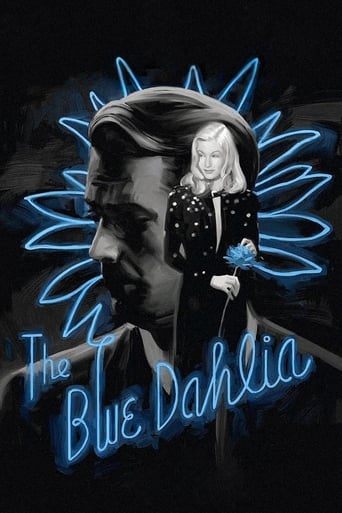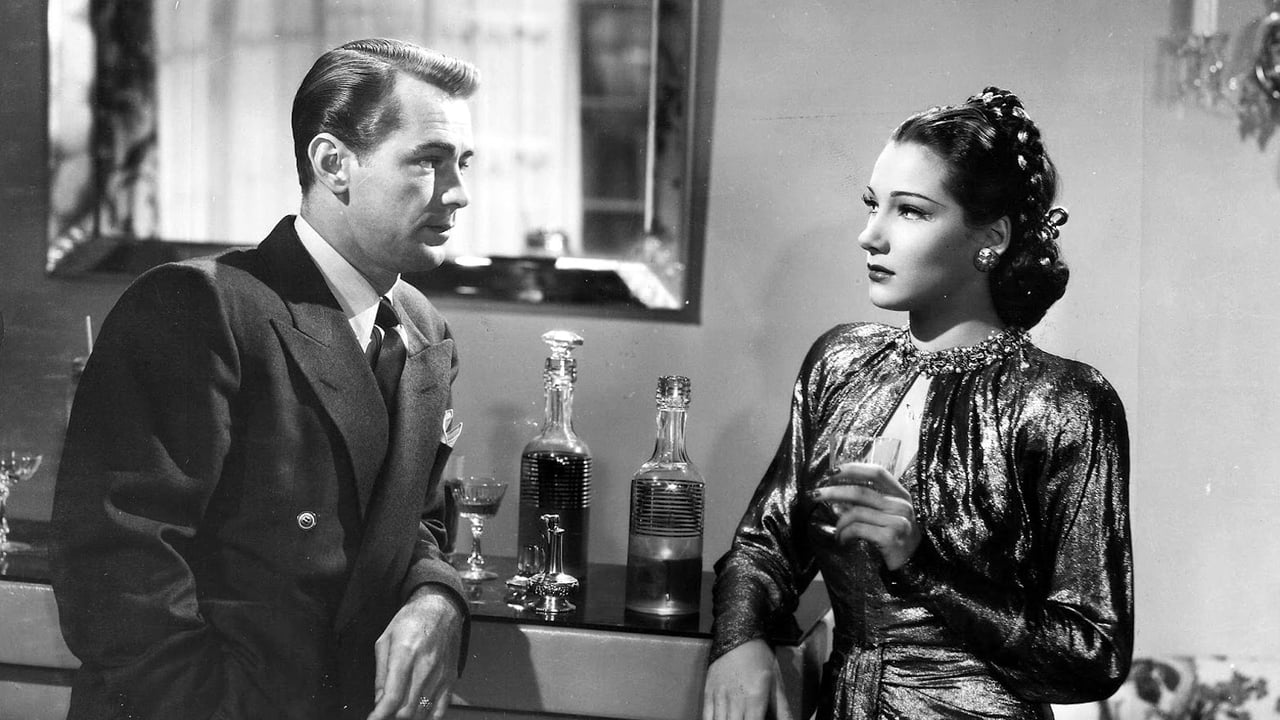James Hitchcock
Recently discharged from the United States Navy, Johnny Morrison arrives back in his home town, Hollywood, eager to be reunited with his wife Helen. He is in for a shock. During his absence serving in the South Pacific, Helen has become a heavy drinker and hard, brassy good-time girl. Johnny also discovers that she is having an affair with a nightclub owner named Eddie Harwood. (The "Blue Dahlia" of the title is the name of Harwood's nightclub). Johnny decides to leave Helen, and when she is murdered shortly afterwards Johnny becomes the prime suspect.Of course, Johnny is not the killer. Although the film was released in 1946, it was shot the previous year while the war was still being fought, and in 1945 there was no way in which Hollywood was going to make a returning war hero a murderer. Aided by his old Navy buddies Buzz Wanchek and George Copeland and by Harwood's estranged wife Joyce, he goes on the run to try and expose the real killer. It then gets a lot more complicated, but this is only to be expected given that the script was written by Raymond Chandler. (This was Chandler's first original screenplay).For most of the film the audience have no idea who the killer really is; his or her identity is only revealed at the very end. In fact, for most of the time during filming the cast and director George Marshall did not know who the culprit is. Even Chandler did not know. The reason for this strange state of affairs was that the studio, Paramount, were anxious to get the film completed as soon as possible, fearing that its star Alan Ladd, who had briefly served in the army before being discharged on medical grounds, might be conscripted again. (In the event this never happened). As a result, they started shooting without a finished screenplay and Chandler continued working on it while filming of the early scenes was taking place.Chandler had particular difficulty in writing the ending in which the murderer is revealed. He evidently rejected the most obvious solution, that the killer is Harwood, possibly because it seemed too obvious. His original idea was that Buzz, who is suffering from mental disturbances after being wounded in the war, would turn out to have killed Helen in a fit of madness, but Paramount, at the insistence of the Navy, vetoed this suggestion. (As I said, in 1945 Hollywood was never going to make a returning war hero a murderer). Chandler, who was drinking heavily at the time, therefore had to come up with an alternative solution, something that was not achieved without a good deal of anguish.I wouldn't class "The Blue Dahlia" as one of the great films noirs- it is not quite on a par with something like "The Big Sleep" or "Gilda", to take two other films from the same year- but given the rather chaotic conditions under which it was produced, it is surprising that it is as good as it is. Ladd gives a good performance as Johnny, as does William Bendix as the tormented Buzz, although Veronica Lake, in her third appearance with Ladd, does not make quite such an impression as she did in some of the others. (Chandler took a strong dislike to Lake, possibly because she had never previously heard of him, calling her "Moronica". Lake seemed to have a talent for making enemies, which explains in part why her career, although at times an impressive one, was also a short one).As often with noir, the plot is perhaps more complex than it needs to be, but this is the sort of film which depends less upon plot than it does upon atmosphere. It is a film about returning war heroes, made just before the end of the war and released just after it, yet the mood of the film is far from heroic or triumphant. Johnny, George and Buzz have put their lives on the line for their country, but the country they are returning to is shown here as a corrupt, seedy land of cheap criminals and hoodlums. Although there is a "happy" ending in that Johnny and Buzz's innocence is eventually vindicated, this does not altogether overcome the rather sour pessimism which is the dominant mood of this film, a mood which it shares with some other films noirs from the period. This pessimism contrasts oddly with the triumphant optimism with which many greeted the return of peace in 1945, but it also perhaps served as a necessary corrective to it. 7/10
chaswe-28402
Raymond Chandler sometimes reminds me of F.Scott Fitzgerald. Both writers fuelled their industry by filling up their creative tanks with alcohol. You can detect this when reading their stories, especially those by Chandler. They are always interesting, because the plot lurches tipsily from one angle to another, and you never know what's going to happen next. This is because the author doesn't know either.By all accounts, he didn't know what was going to happen in this, his only solo screenplay. But he was a dab hand at penning dialogue, and description. In this film his alter ego must have been Buzz, hiding his intoxication under a plate covering a wound in his skull. Buzz gets the best lines. He is fantastically blunt and rude to everyone else in the story. He's pretty ready for a drink, as well. Straight bourbon, with a bourbon chaser. Followed by a variety of fist fights.One way of figuring a whodunnit is to pin the murder on the least likely person. This isn't too difficult here, since there is no real reason for the least likely person to feature in the story, and you might well wonder what he's doing in it the first place. In fact, he has no obvious motivation at all, which makes the ending fall slightly flat. But it is still quite entertaining, and it keeps you guessing. The loose ends are not otherwise very well tidied up. Why is the film called The Blue Dahlia ? Who actually shot Harwood, the owner of The Blue Dahlia ? What happened to his henchmen ? Not to worry. Just sit back and let it all sink in. The hangover won't arrive until later.
JasparLamarCrabb
War hero Alan Ladd returns home to find out his wife (Doris Dowling) has been cheating on him with sleazy nightclub owner Howard DaSilva. When she ends up dead, Ladd is the chief suspect. Foxy Veronica Lake (DaSilva's estranged wife) helps him figure out who the real killer is. Full of eccentric dialog and MANY eccentric characters, George Marshall's noir classic is immensely entertaining with a very clever script by none other than Raymond Chandler. Ladd & Lake have dynamite chemistry and the supporting cast is first rate. Dowling is great as a bitchy barfly and Hugh Beaumont, Howard Freeman and William Bendix are in it too. Bendix steals the film as a very damaged war vet. The great cinematography is by Lionel Lindon.
GManfred
The story goes that Raymond Chandler was under the gun to finish the script for "The Blue Dahlia", and so chased his demons away as best he could to put the last period in a timely manner to satisfy Paramount studio heads. The result is a thoroughly enjoyable noir with no basis in reality and succeeds due to the efforts of a first-rate cast and director.The theory of the Phenomena of Coincidence is stretched to the limits as scene after scene is loaded with 'wouldn't ya know it' circumstances as well as dumb-luck stuff that defies belief. But this is Hollywood, where that kind of thing happens all the time. Where else could the hero, on the lam as they say in noir, hitch a ride with the wife of the villain of the piece? or get taken to a hotel to get fleeced by two guys who have nothing to do with the story?Not an awful lot of logic here, plus an abrupt ending which doesn't quite fit. But the stars are great and the story works on you like a scotch on the rocks, or two. Hooray for Hollywood!



 AD
AD



